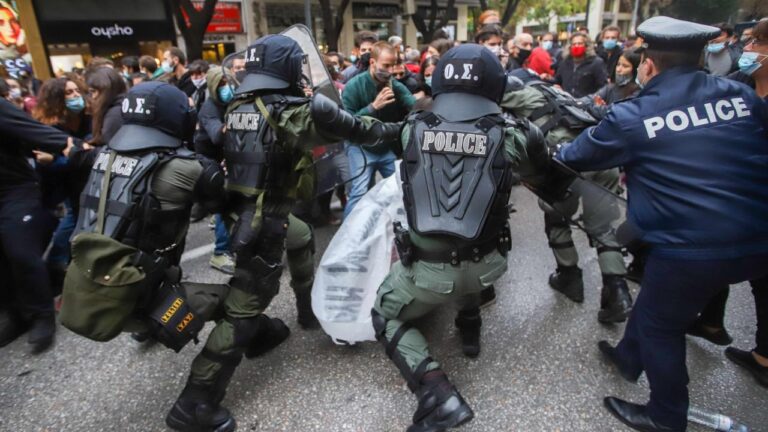
More than 5,500 police officers are expected to take part in draconian security measures on the streets of Athens, for the anniversary of the Polytechnic Uprising on November 17.
From the air, police helicopters and drones will continuously monitor Athens, while the roofs of buildings, used in previous years to attack police, will be under surveillance.
Water cannons for crowd control will be stationed in downtown Athens, ready to intervene if necessary.
Moreover, there is a special operational plan to identify points where "ammunition" (such as petrol bombs, stones and other objects) might be hidden.
RESOURCE | ABOUT ATHENS POLYTECHNIC UPRISING
The Athens Polytechnic uprising occurred in November 1973 as a massive student demonstration of popular rejection of the Greek military junta of 1967–1974. The uprising began on 14 November 1973, escalated to an open anti-junta revolt, and ended in bloodshed in the early morning of 17 November after a series of events starting with a tank crashing through the gates of the Polytechnic.
Since 21 April 1967, Greece had been under the dictatorial rule of the military, a regime which abolished civil rights, dissolved political parties and exiled, imprisoned and tortured politicians and citizens based on their political beliefs. 1973 found the military junta leader Georgios Papadopoulos having undertaken a "liberalisation" process of the regime, which included the release of political prisoners and the partial lifting of censorship, as well as promises of a new constitution and new elections for a return to civilian rule. Opposition elements including Socialists were thus given the opportunity to undertake political action against the junta.
The United States took a clandestine interest in suppressing Socialists and had a C.I.A. operative named John Maury who was in consultation supporting the Junta Leaders. American Vice President Spiro Agnew praised the junta as "the best thing to happen to Greece since Pericles ruled in ancient Athens".
The junta, trying to control every aspect of politics, had interfered with student syndicalism since 1967, by banning student elections in universities, forcibly drafting students and imposing non-elected student union leaders in the national students' union, EFEE . These actions eventually created anti-junta sentiments among students, such as geology student Kostas Georgakis who committed suicide in 1970 in Genoa, Italy as an act of protest against the junta.
The first massive public action against the junta came from students on 21 February 1973, when law students went on strike and barricaded themselves inside the buildings of the Law School of the University of Athens in the centre of Athens, demanding repeal of the law that imposed forcible drafting of "subversive youths", as 88 of their peers had been forcibly drafted to the army. The police were ordered to intervene and many students were reportedly subjected to police brutality. The events at the Law School are often cited as the prelude to the Polytechnic uprising.
The student uprising was also heavily influenced by the youth movements of the 1960s, notably the events of May 1968 in France.
An anti-dictatorial student movement was growing among the youth, and the police utilised brutal methods and torture towards them, in order to confront the threat.
17 November
In the early hours of November 17, 1973, the transitional government sent a tank crashing through the gates of the Athens Polytechnic. Soon after that, Spyros Markezinis himself had the task to request Papadopoulos to reimpose martial law. Prior to the crackdown, the city lights had been shut down, and the area was only lit by the campus lights, powered by the university generators. An AMX 30 Tank (still kept in a small armored unit museum in a military camp in Avlonas, not open to the public) crashed the rail gate of the Athens Polytechnic at around 03:00 am. In unclear footage clandestinely filmed by a Dutch journalist, the tank is shown bringing down the main steel entrance to the campus, to which people were clinging. Documentary evidence also survives, in recordings of the "Athens Polytechnic" radio transmissions from the occupied premises. In these a young man's voice is heard desperately asking the soldiers (whom he calls 'brothers in arms') surrounding the building complex to disobey the military orders and not to fight 'brothers protesting'. The voice carries on to an emotional outbreak, reciting the lyrics of the Greek National Anthem, until the tank enters the yard, at which time transmission ceases.
An official investigation undertaken after the fall of the Junta declared that no students of the Athens Polytechnic were killed during the incident. Total recorded casualties amount to 24 civilians killed outside Athens Polytechnic campus. These include 19-year-old Michael Mirogiannis, reportedly shot to death by officer Nikolaos Dertilis, high-school students Diomedes Komnenos and Alexandros Spartidis of Lycee Leonin, and a five-year-old boy caught in the crossfire in the suburb of Zografou. The records of the trials held following the collapse of the Junta document the circumstances of the deaths of many civilians during the uprising, and although the number of dead has not been contested by historical research, it remains a subject of political controversy. In addition, hundreds of civilians were left injured during the events.
Ioannides' involvement in inciting unit commanders of the security forces to commit criminal acts during the Athens Polytechnic uprising was noted in the indictment presented to the court by the prosecutor during the Greek junta trials and in his subsequent conviction in the Polytechneion trial where he was found to have been morally responsible for the events.